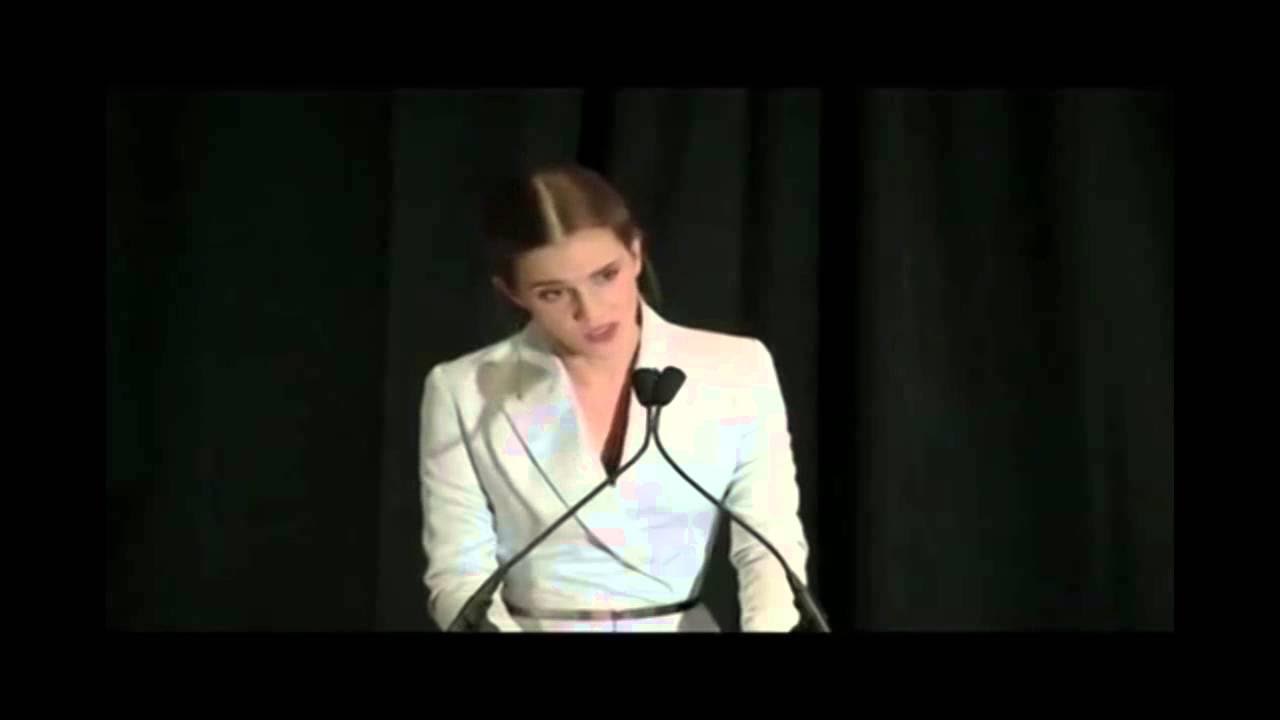Emma Watson at the HeForShe Campaign 2014 - Official UN Video
Summary
TLDREmma Watson, as UN Women's Global Goodwill Ambassador, passionately advocates for gender equality in her HeForShe campaign launch speech. She emphasizes the importance of involving both men and women in fighting for equal rights, challenging gender stereotypes, and promoting a spectrum of gender identities. Watson calls for collective action to ensure freedom and equality for all, urging everyone to consider their role in this movement.
Takeaways
- 🌟 Emma Watson is a UN Women's Global Goodwill Ambassador and advocates for gender equality.
- 📢 The HeForShe campaign is launched to involve men and boys as advocates for gender equality.
- 🔍 Watson emphasizes the need for tangible actions to end gender inequality, not just discussions.
- 🚫 She clarifies that feminism is about equality of rights and opportunities for all genders, not man-hating.
- 🤔 Watson's personal journey with feminism began early, questioning gender stereotypes from the age of eight.
- 🏆 She highlights the importance of gender equality in her own life, benefiting from supportive parents, mentors, and schools.
- 😔 Despite progress, Watson points out that no country has achieved gender equality and many women are not as fortunate as her.
- 👏 She calls for more inadvertent feminists to change the world by challenging gender norms and stereotypes.
- 👨👧👦 Watson invites men to join the cause, noting that gender equality benefits everyone, including men and boys.
- 💪 She argues that breaking free from gender stereotypes will allow both men and women to be more authentic versions of themselves.
- 🤔 Watson reflects on her own doubts and nervousness, using the questions 'If not me, who? If not now, when?' to encourage action.
Q & A
Who is the speaker in the provided transcript and what is her role?
-The speaker is Emma Watson, a leading British actor and the UN Women's Global Goodwill Ambassador.
What is the name of the campaign launched in the transcript?
-The campaign launched is called HeForShe.
What is the main purpose of the HeForShe campaign?
-The main purpose of the HeForShe campaign is to end gender inequality and to involve as many men and boys as possible to be advocates for change.
What does Emma Watson believe feminism stands for?
-Emma Watson believes that feminism stands for the belief that men and women should have equal rights and opportunities, and it is the theory of political, economic, and social equality of the sexes.
At what age did Emma Watson start questioning gender-based assumptions?
-Emma Watson started questioning gender-based assumptions when she was eight years old.
Why does Emma Watson believe the word 'feminism' has become uncomfortable for some?
-Emma Watson believes the word 'feminism' has become uncomfortable because it has often been misunderstood as synonymous with 'man hating', and some women's expressions are seen as too strong, too aggressive, isolating, and anti-men.
What does Emma Watson consider to be her life's privilege that has shaped her views on gender equality?
-Emma Watson considers her life's privilege to be the fact that her parents, school, and mentors did not limit her opportunities or assume less of her because she was a girl.
What issue does Emma Watson highlight regarding men's mental health in the UK?
-Emma Watson highlights that in the UK, suicide is the biggest killer of men between twenty to forty-nine, and she attributes this in part to societal expectations that prevent men from seeking help for mental health issues.
What is Emma Watson's view on how gender equality can affect both men and women?
-Emma Watson believes that gender equality is not just a women's issue but also men's, as it can free men from stereotypes and allow them to be more sensitive and human, which in turn will benefit women.
What is the historical reference Emma Watson makes regarding the audience composition at a famous speech about women's rights?
-Emma Watson refers to Hillary Clinton's famous speech in Beijing in 1997, noting that less than thirty percent of the audience were male, which she sees as a problem for effecting change.
What is Emma Watson's call to action for the audience in the HeForShe campaign?
-Emma Watson's call to action is for people to step forward, be seen, and ask themselves 'If not me, who? If not now, when?' in support of the HeForShe campaign.
Outlines

Этот раздел доступен только подписчикам платных тарифов. Пожалуйста, перейдите на платный тариф для доступа.
Перейти на платный тарифMindmap

Этот раздел доступен только подписчикам платных тарифов. Пожалуйста, перейдите на платный тариф для доступа.
Перейти на платный тарифKeywords

Этот раздел доступен только подписчикам платных тарифов. Пожалуйста, перейдите на платный тариф для доступа.
Перейти на платный тарифHighlights

Этот раздел доступен только подписчикам платных тарифов. Пожалуйста, перейдите на платный тариф для доступа.
Перейти на платный тарифTranscripts

Этот раздел доступен только подписчикам платных тарифов. Пожалуйста, перейдите на платный тариф для доступа.
Перейти на платный тарифПосмотреть больше похожих видео

Emma Watson Speech Consecutive Interpreting Task

Emma Watson speech for HeForShe Second Year Anniversary (20/9/16)

Emma Watson HeForShe Speech at the United Nations | UN Women 2014

Emma Watson's Speech on Gender Equality | ENGLISH SPEECH with BIG Subtitles

Inspirational speech to United Nations on gender equality, Emma Watson

Gender inequality | HIYA KATHURAI | TEDxYouth@TCHS
5.0 / 5 (0 votes)
